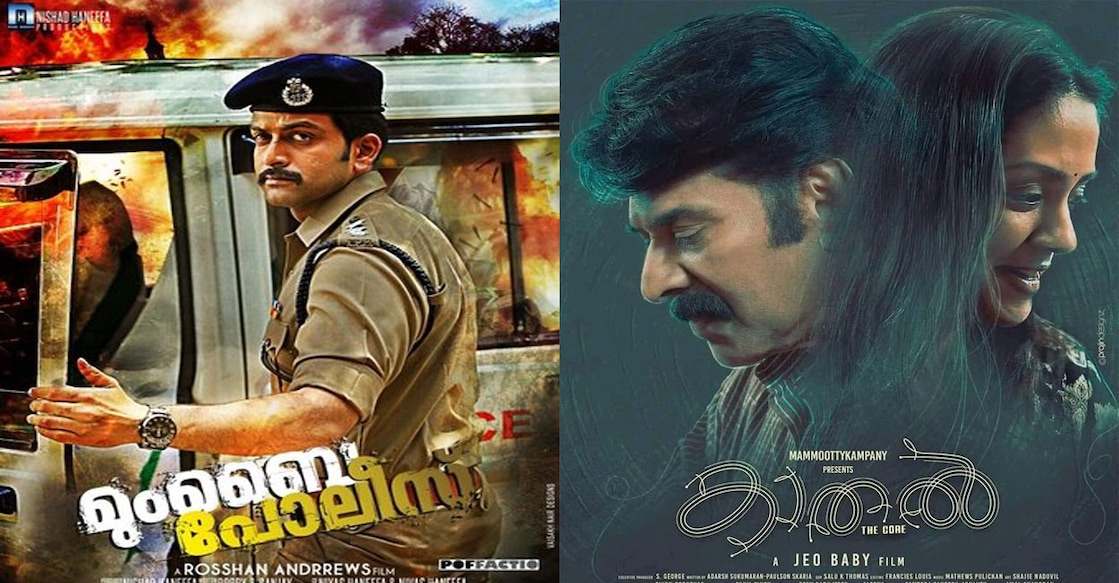Mammootty's 'Kaathal' and Prithviraj's 'Mumbai Police': Two perspectives on LGBTQ struggles

Mail This Article
Experiencing a revival almost a decade ago, Malayalam cinema ventured into addressing various issues and themes previously overlooked. During this period, the LGBTQ community and their rights became prominent subjects, with 'Mumbai Police' emerging as a notable film exploring this theme.
Written by Bobby-Sanjay and directed by Rosshan Andrrews, the film unfolds the story of a gay police officer (Prithviraj) who takes an extreme step, killing his best friend and fellow officer (Jayasurya), fearing societal backlash due to his sexual orientation. In Kerala, acceptance of the LGBTQ community has historically been lukewarm. The release of Jeo Baby's 'Kaathal - The Core', featuring Mammootty a decade after 'Mumbai Police', suggests that a significant portion of Kerala still remains unreceptive. This sentiment is evident in the comments on Mammootty's social media posts related to Kaathal. The 10-year gap between the two films highlights how both movies, in their own ways, address a pertinent issue.
In 'Mumbai Police', the focus was on the overwhelming guilt and shame a person felt about their own sexual orientation, driven by a desire to conceal it at any cost. The fear of not being perceived as a true 'man' haunted the character. On the other hand, 'Kaathal' approaches the issue with grace and dignity. While Mammootty's character, Mathew, grapples with the challenge of coming out, there's a notable difference. Mathew is not burdened by shame; he accepts his truth, and even his wife treats him with dignity.
The focal point is how certain segments of the 'family' audience still hold reservations towards the queer community. The negative reception to one of Malayalam cinema's biggest stars portraying a homosexual character in 'Kaathal' reveals the prevailing attitude. The influx of hate comments on the megastar's account, post-release, highlights the resistance stemming from the perception that the LGBTQ community doesn't align with the cultural values of their locale.
In 2013, when 'Mumbai Police' was released, it faced mixed reactions due to the limited awareness and openness about sexual orientation. Many viewed it as not a family-friendly movie, expressing concerns about Prithviraj's character. ACP Antony Moses, portrayed by Prithviraj, lives a concealed life, fearing societal backlash if his homosexuality is revealed. To project his masculinity and hide his true self, he adopts a tough demeanour, often subjecting others to his torment.
In 'Kaathal', the story around Mathew takes a different turn. While some characters disapprove of his sexual orientation, it is viewed as a more 'modern' aspect. The movie explores discussions about potentially ostracising Mathew by the church due to his orientation, yet Mathew remains composed amid the struggles. Unlike ACP Antony Moses, he doesn't feel compelled to assert his manliness.
At their core, these two men share similarities—they're both haunted by fear. The moment where Mammootty breaks down in front of his father and wife stands out as one of the most heart-wrenching scenes in 'Kaathal.' He confesses to his wife, expressing his deep fear—fear of himself and others. In 'Mumbai Police,' Antony is also gripped by fear, afraid of the consequences if his truth is revealed. However, it's the distinct reactions of these two men to their circumstances that distinguish these films.
Upon learning that their secret is at risk of exposure, Antony and his partner become frantic and paranoid, a stark contrast to Mathew and Thangan's response. Despite their age, Mathew and Thangan experience a sense of panic, but instead of succumbing to fear, they choose acceptance. Thangan, notably, stands out as the character without a privileged background, and his friend in the movie highlights this disparity. Despite the challenges, Thangan navigates the situation with remarkable dignity.
Certainly, hailing from a privileged background can provide a degree of assistance in overcoming fears and challenges, but the struggle persists when it comes to one's sexuality. In 'Kaathal,' Muthumani, playing Omana's advocate, emphasizes that being homosexual is not a crime, questioning why Mathew feels compelled to hide it. The movie underscores that being homosexual does not equate to lacking decency.
While these concepts may seem fundamental, there remains a significant portion of the global population, not exclusive to Kerala, that harbours discomfort with homosexuality. Some perceive it as a malady, erroneously believing it can be remedied. Both movies shed light on the deep impact societal non-acceptance can have on the lives of homosexual individuals. While some may contend that one shouldn't worry about others' opinions, the actual situation is more complex.


